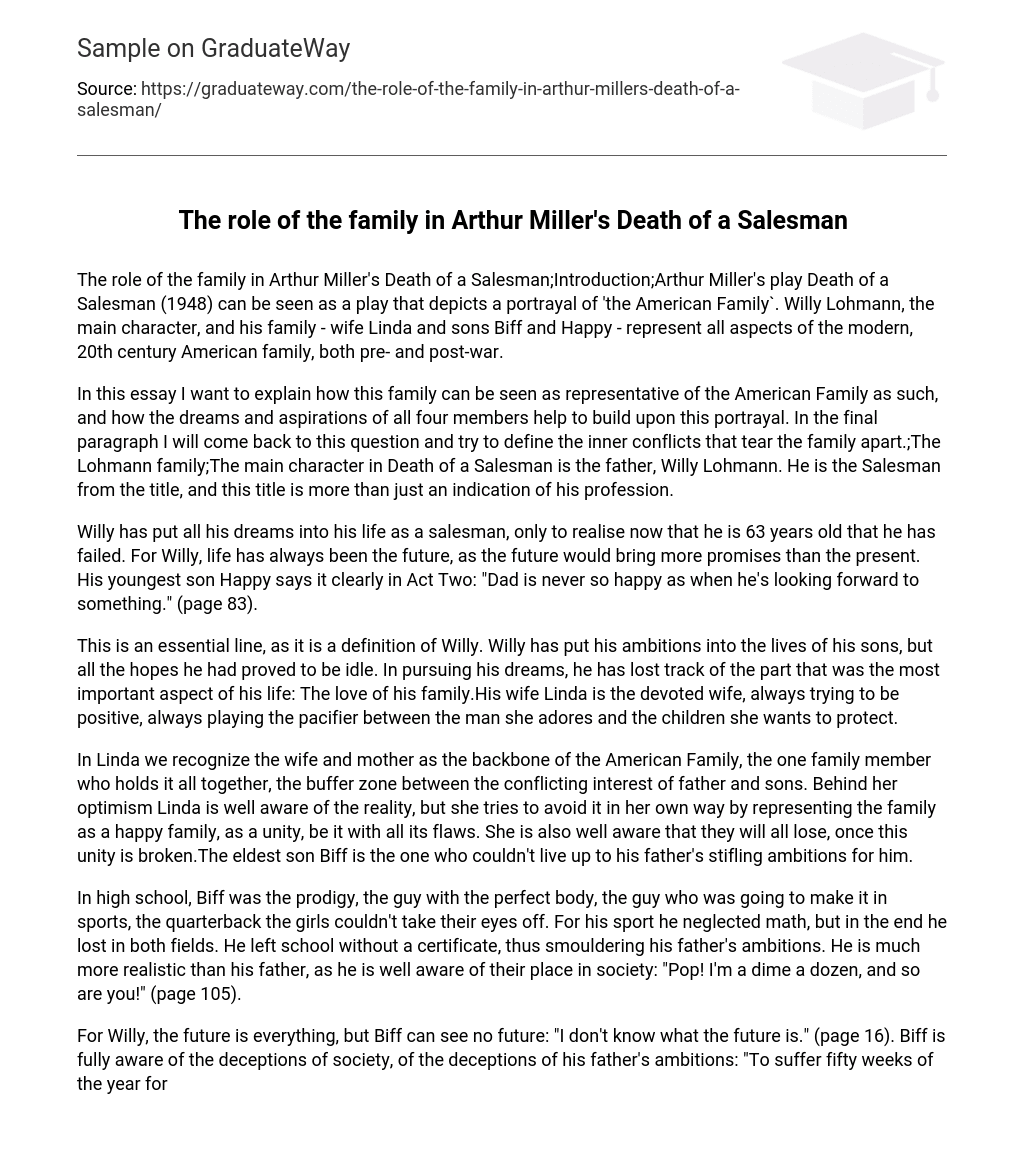The role of the family in Arthur Miller’s Death of a Salesman;Introduction;Arthur Miller’s play Death of a Salesman (1948) can be seen as a play that depicts a portrayal of ‘the American Family`. Willy Lohmann, the main character, and his family – wife Linda and sons Biff and Happy – represent all aspects of the modern, 20th century American family, both pre- and post-war.
In this essay I want to explain how this family can be seen as representative of the American Family as such, and how the dreams and aspirations of all four members help to build upon this portrayal. In the final paragraph I will come back to this question and try to define the inner conflicts that tear the family apart.;The Lohmann family;The main character in Death of a Salesman is the father, Willy Lohmann. He is the Salesman from the title, and this title is more than just an indication of his profession.
Willy has put all his dreams into his life as a salesman, only to realise now that he is 63 years old that he has failed. For Willy, life has always been the future, as the future would bring more promises than the present. His youngest son Happy says it clearly in Act Two: “Dad is never so happy as when he’s looking forward to something.” (page 83).
This is an essential line, as it is a definition of Willy. Willy has put his ambitions into the lives of his sons, but all the hopes he had proved to be idle. In pursuing his dreams, he has lost track of the part that was the most important aspect of his life: The love of his family.His wife Linda is the devoted wife, always trying to be positive, always playing the pacifier between the man she adores and the children she wants to protect.
In Linda we recognize the wife and mother as the backbone of the American Family, the one family member who holds it all together, the buffer zone between the conflicting interest of father and sons. Behind her optimism Linda is well aware of the reality, but she tries to avoid it in her own way by representing the family as a happy family, as a unity, be it with all its flaws. She is also well aware that they will all lose, once this unity is broken.The eldest son Biff is the one who couldn’t live up to his father’s stifling ambitions for him.
In high school, Biff was the prodigy, the guy with the perfect body, the guy who was going to make it in sports, the quarterback the girls couldn’t take their eyes off. For his sport he neglected math, but in the end he lost in both fields. He left school without a certificate, thus smouldering his father’s ambitions. He is much more realistic than his father, as he is well aware of their place in society: “Pop! I’m a dime a dozen, and so are you!” (page 105).
For Willy, the future is everything, but Biff can see no future: “I don’t know what the future is.” (page 16). Biff is fully aware of the deceptions of society, of the deceptions of his father’s ambitions: “To suffer fifty weeks of the year for the sake of a two-week vacation, when all you really desire is to be outdoors, with your shirt off. And always to have to get ahead of the next fella.
” (page 16). The path his father paved for him is the path he cannot take, and this is only reinforced when he finds his father with another woman in a hotel room in Boston. He loses all respect; he sees with his own eyes what the life of the salesman has had in store for his father.The youngest son, Happy, wants much more than his older brother to try to keep up a face of success.
He doesn’t want to give up on his dreams, be it in establishing a firm with his brother, or be it in keeping his father’s dreams alive, of a successful family that is going to make it one day. But in the end his fake and opportunistic attitude is more damaging than the honesty of his brother. Like Biff, Happy is not able to live up to his father’s and his own expectations. In the end his job doesn’t offer him any more success than the salesmanship job did to Willy.
As such, all three men are in the same boat.Money, or rather the lack of money, is the essential drive in Willy’s life. If he had money, Biff could fulfil his ambitions by setting up his own business, the one thing Willy has always wanted in life. But for Biff money is not the essential drive.
He wants the love of his father, he wants to escape his father’s ambitions and he wants his father to see him for what he is, and that is not the salesman his father has in mind: “I’m no good, can’t you see what I am?” (page 89). Conclusion In Death of a Salesman, we see how the concept of the American family functions as the backbone of the life of all family members. Once this backbone is damaged, the family falls apart. The mother tries to keep this backbone in tact, but in the end it is not enough.
The interests of the other family members are too much opposed and as such their influence is stronger than Linda’s attempts to keep the family together.;All quotes are taken from: Arthur Miller: Death of a Salesman. Penguin Classics, 2000.





